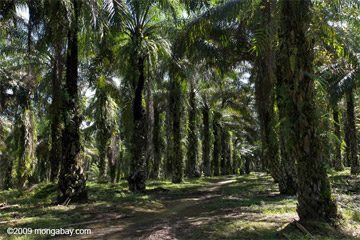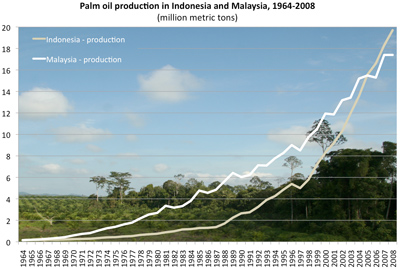The world’s biggest buyer of palm oil, Unilever, says it will again purchase palm oil from PT SMART, a subsidiary of Indonesian company Sinar Mas, if allegations about deforestation and peatland destruction prove untrue, or if Sinar Mas shows it is addressing the issue. Last December, the food and cosmetic giant, Unilever, suspended its $32.6 million contract with Sinar Mas after an independent audit—spurred by a 2008 Greenpeace report—showed that the Indonesian company was involved in the illegal destruction of rainforests and peatlands. Yet the company now seems to be signaling that the contract is back on the table even as it touts its sustainability efforts to the public.
“If the [assessment] teams say there was no evidence of deforestation by Smart [PT Sinar Mas Agro Resources and Technology] in producing its [crude palm oil], or if there was indeed evidence of deforestation but Smart has already made the necessary improvements, we will consider buying from Smart again,” said Sancoyo Antarikso was reported as saying by the Jakarta Globe. Antarikso is corporate secretary and general manager for external relations at Unilever Indonesia.
 Palm oil plantation in Sumatra. Photo by: Rhett A. Butler. |
Last week Sinar Mas and Unilever announced that they had hired two independent auditors the Control Union Certification and the British Standard Institute to further investigate claims made in the Greenpeace report that directly linked Sinar Mas to forest destruction using maps, satellite data, and on-the-ground investigations.
While palm oil is the world’s most productive oil seed (far outstripping soy, which is linked to deforestation in the Amazon), it is responsible for a significant percentage of deforestation in Malaysia and Indonesia. For example, a study in Conservation Letters found that 55-59 percent of palm oil plantations in Malaysia built between 1990 and 2009 occurred on forested land. This has created an environmental crisis: biodiversity loss in some of the world richest habitats, conflict with indigenous groups who depend on the forests for their livelihood, and sizeable greenhouse gas emissions. Indonesia has the world’s third largest greenhouse gas emissions, yet unlike industrial behemoths China and the US, Indonesia’s emissions are largely due to deforestation and peatland destruction. While orangutans have become the symbol of palm oil debate, the destruction of rainforests in these two countries threatens a wide variety of species, both known and unknown.
There is no question that palm oil has been an economic boon to the region. The industry is closely tied to both governments of Indonesia and Malaysia and provides big chunks of tax revenue. However, the industry’s affect on poverty remains largely debated. Many oil palm workers still live below their nations’ poverty line.
A sustainable Unilever?
Even as Unilever announces it may again begin sourcing from Sinar Mas, the Dutch-English company is also pushing in a PR campaign touting sustainability efforts in its palm oil chain.
 |
The company has released a new add that reads in part: “What you buy in the supermarket can change the world […] Small action, big difference”. The words standout above a lush rainforest, sporting the Unilever logo on one side (see below).
By 2015 Unilever has pledged to purchase only sustainable palm oil. According to Unilever’s PR campaign last year 15 percent of its palm oil was sustainably certified by the Roundtable on Sustainable Palm Oil (RSPO) and this year it hopes to double that.
Unilever also announced today that it had purchased enough GreenPalm certificates to cover all of the palm oil used in its products in Europe, Australia, and New Zealand. A certificate trading program, GreenPalm, is meant to allow companies to bypass supply-chain complexities and financially support sustainable palm oil even if their actual sources are not sustainably certified.
“This is an important achievement and a significant step in our journey towards sustainable palm oil sourcing. Until suitable segregated supply chains become available, GreenPalm certificates are the best option to encourage growers to comply with the requirements of the RSPO and certify their plantations as sustainable,” said Gavin Neath, Unilever’s SVP Global Communications and Sustainability, in a press release. Last year Unilever purchased 80 percent of the total GreenPalm certificates sold.
The GreenPalm scheme is supported by the RSPO, but it does have its detractors.
“Until there is an industry wide agreement by palm oil producers to stop destroying rainforest and peatland Greenpalm certificates will offer no guarantee of sustainability,” says Ian Duff, Greenpeace Forest Campaigner. “Greenpalm certificates are only as good as the standards that underpin them. That’s why Greenpeace is calling for a moratorium on all further rainforest and peatland clearance for palm oil in Indonesia.”
While many decry Greenpeace—both in the industry and in the environmental movement—for being too hard-line on palm oil, none doubt that Greenpeace’s reports and actions against corporations have had an impact.
For its part, Unilever has been more responsive to deforestation allegations than many other corporations, such as Cargill, which still sources from Sinar Mas, and Nestle which is being protested on social media sites for buying palm oil from Cargill.
Unilever owns a number of well-known brands, including Dove, Lipton, Surf, Ben and Jerry’s, Breyer, Klondike, and Ragu. The corporation used 1.3 million tons of palm oil every year, approximately 4 percent of the world’s total palm oil.

Advertisement apart of Unilever’s green PR campaign.
Related articles
BBC documentary leads Unilever to blacklist Indonesian palm oil company
(02/24/2010) Unilever has told Indonesian suppliers to stop sourcing palm oil from Duta Palma due to concerns over deforestation, reports Reuters.
Cheerios maker linked to rainforest destruction
(01/19/2010) An activist group linked General Mills to destruction of rainforests in Southeast Asia in dramatic fashion on Tuesday, when it unfurled a giant banner, reading “Warning: General Mills Destroys Rainforests”, outside the company’s Minneapolis headquarters building.
Forest destruction by Sinar Mas undermines efforts to develop and promote greener palm oil
(12/14/2009) An investigation commissioned by Unilever, the world’s largest buyer of palm oil, confirms that Indonesian group Sinar Mas, the world’s second largest producer of palm oil, has been destroying forests and peatlands despite committing to “greener” palm oil production as a member of the Roundtable on Sustainable Palm Oil (RSPO). Unilever has now suspended its $32.6 million contract with Sinar Mas.
Unilever suspends palm oil contract after supplier found to be destroying rainforests

(12/12/2009) The world’s largest user of palm oil, Unilever, has suspended its $32.6 million contract with the Indonesian group Sinar Mas after an independent audit proved that Sinar Mas is involved in the destruction of rainforest, reports Reuters. The audit was conducted early this year after a report by Greenpeace alleged that Sinar Mas was engaged in deforestation and the draining of peatlands, both of which release significant amounts of greenhouse gases into the atmosphere. Deforestation across Indonesia and Malaysia, in part for oil palm plantations, has also added pressure on many many endangered species, including orangutans, tigers, elephants, and rhinos.
Oil palm workers still below poverty line, despite Minister’s statements
(11/19/2009) On October 19th, Plantation Industries and Commodities Minister Tan Sri Bernard Dompok told parliament that oil palm harvesters and rubber tappers are living above Malaysia’s national poverty line, according to a story in the Malaysian Insider. But now representatives of the workers are saying Dompok lied.
Blackwashing by NGOs, greenwashing by corporations, threatens environmental progress
(11/12/2009) Misinformation campaigns by both corporations and environmental groups threaten to undermine efforts to conserve biodiversity and reduce environmental degradation, argues a new paper published in the journal Biotropica. Growing concerns over climate change and unsustainable resource extraction have put companies that exploit the environment in the spotlight. Some firms have responded by taking measures to reduce their environmental impact. Others have alternatively engaged in sophisticated marketing campaigns intended to mislead consumers on their environmental performance, maintaining that environmentally-destructive practices are instead benign. At the same time some activist groups have been guilty of exaggerating claims of environmental misconduct in order to boost support for their campaigns and therefore their fundraising efforts.
40% of lowland forests in Sumatra and Indonesian Borneo cleared in 15 years
(11/10/2009) Forty percent of lowland forests in Sumatra and Kalimantan (Indonesian Borneo) were cleared from 1990 to 2005, reports a new high resolution assessment of land cover change in Indonesia.